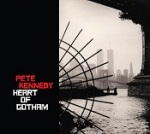 We seem to have an outbreak of singles this year; mostly it’s albums coming through the letterbox or into the inbox, but 2020 has seen a few singles, notably three from Danny Schmidt over the summer and one from Tim Grimm in October. In turbulent times, artists will respond with creativity and these have been turbulent times on both sides of the Atlantic. There’s been plenty to write about from both a social and personal point of view and it’s a challenge that’s been taken up by Danny and Tim, and now Ed Dupas.
We seem to have an outbreak of singles this year; mostly it’s albums coming through the letterbox or into the inbox, but 2020 has seen a few singles, notably three from Danny Schmidt over the summer and one from Tim Grimm in October. In turbulent times, artists will respond with creativity and these have been turbulent times on both sides of the Atlantic. There’s been plenty to write about from both a social and personal point of view and it’s a challenge that’s been taken up by Danny and Tim, and now Ed Dupas.
Just so you know, I’m a big fan of Ed Dupas; he’s a superb songwriter with a rough-hewn, lived-in voice and a good acoustic and electric player. We’ve reviewed three of Ed’s albums here over the last few years and generally the songs lean towards melancholy and are very personal, with a few notable exceptions (the stunning “Flag”, “Too Big to Fail” and “State of the Nation”); “This Old Heart” is very different. It’s a mid-tempo song with an uplifting cajun feel (with a synthesised accordion sound, apparently) and it’s a song of immense hope.
The song was started at around the beginning of the COVID outbreak and then set aside until it began to reassert its presence several weeks later as a song of renewal and redemption. The pandemic is far from over, but the presidential election might offer some hope of healing. Who knows? It’s certainly an opportunity.
“This Old Heart” opens and closes with symbolic sounds – it begins with highway noise and an engine igniting to represent the start of the journey, builds up from an acoustic intro to a full band sound, and closes with a heartbeat. What happens in between is the shift from a time of no hope (‘It’s been a long night for a long, long time’) to a future where we might just be able to help each other along. I’ll raise a glass to that.
Check out Ed’s website as well. In addition to the regular music site items, there’s also a blog featuring Ed’s thoughts on many other subjects, which is thoughtful and fascinating.
“This Old Heart” is released in the UK on Friday November 20th.
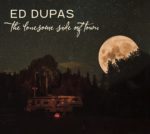 It’s fair to say I’m not a prolific reviewer; it’s all about the process. The first listen to an album decides whether it moves me enough to review it, then it gets another five or six listens before I make some notes, track by track. Then I look at the press release and lyric sheets, sleeve notes and anything else that came with the songs. It’s just the way I do it and it throws up some interesting little insights. And there are some artists that you look forward to reviewing because they always make you think very carefully about their work; Ed Dupas is one of those artists. He writes a lot of songs about relationships, happy or sad, but you know that each album will have one song that digs deep and pulls out a reaction to the world that surrounds us. We’ll get to that in a while.
It’s fair to say I’m not a prolific reviewer; it’s all about the process. The first listen to an album decides whether it moves me enough to review it, then it gets another five or six listens before I make some notes, track by track. Then I look at the press release and lyric sheets, sleeve notes and anything else that came with the songs. It’s just the way I do it and it throws up some interesting little insights. And there are some artists that you look forward to reviewing because they always make you think very carefully about their work; Ed Dupas is one of those artists. He writes a lot of songs about relationships, happy or sad, but you know that each album will have one song that digs deep and pulls out a reaction to the world that surrounds us. We’ll get to that in a while.
Most of the songs on “The Lonesome Side of Town” fall into genres that can be labelled as country, rock or some combination of the two. Country’s the dominant force on this album with arrangements featuring pedal steel, lap steel, banjo and resonator, but the addition of a Hammond B3 adds another dimension, taking the sound into The Band territory. And let’s not forget the Merseybeat feel of “Love Me Right”, with its chiming guitars and sus4 chords.
Of the eleven songs, ten are deeply personal, dealing with aspects of a relationship breakdown and one, “State of the Nation”, placed in the dead centre of the album, is the zeitgeist song. Ed Dupas doesn’t do a lot of these, but when he does, they hit, and they hit hard. “State of the Nation” is an out-and-out rocker about the divide between the people who work and the people who benefit from that work. It’s no frills rock ’n’ roll fired out in less than three minutes and it brings to mind Bob Seger’s 1978 song “Feels Like a Number” – well, Ed does live in Ann Arbor, Michigan. As an example of the level of detail in the production, rather than crashing the over-driven guitar in at the beginning of the second verse, it’s faded in just before the beginning of the verse so that it reaches the right level just as the verse begins; just a little touch, but it works perfectly.
But that’s not to belittle the rest of the album. The title song sets the mood for the album as it tells the familiar story of a relationship with a performer, while “It All Sounds like Leaving” could only ever be a country song, particularly with the line ‘Let’s get on with the grieving, cos it all sounds like leaving’. Ed admits to agonising over the track order and losing one song that didn’t fit, and that confirms the message that it more than just a bunch of songs – it’s an album and there are subtle links between the songs. There are three references to ‘within’ or ‘between the lines’ and “On my Way” refers back to “It All Sounds like Leaving”. The more you dig, the more you find.
“The Lonesome Side of Town” is a beautifully-crafted set of songs coming out of a difficult situation. There are songs of heartache, a song of anger and some songs of redemption and moving forward. They are all songs of passion.
“The Lonesome Side of Town” is released in the UK on Friday October 25th on Road Trip Songs.
This is an opportunity that doesn’t come along too often these days – an interview with one of my favourite singers and someone who happens to front one of the best bands I’ve ever seen; a bunch of superb individuals who make a formidable team. Southside Johnny and the Asbury Jukes were on a lightning tour of Europe that included a night at Shepherd’s Bush Empire. Too good to miss, really, so I took a little trip out to Wild West London. Here’s how it went…
Allan
It’s great to see you again, what are you up to these days?
Southside
Well, we have a lot of work this year. I mentioned the word retirement and they immediately booked a thousand gigs. We’re trying to write another Jukes album but it’s been going slowly, so really it’s just been touring and trying to write the album and that’s about it. There’s not much else going on.
Allan
On this tour you had a free day in London yesterday. Did you manage to have a look around?
Southside
I walked all round Shepherd’s Bush and around the mall and I wanted to go to the British Museum but I didn’t get it together to do that, but this is a great walking area. I like this place; it’s a little funky in some areas but that’s good for me. I just love walking around London, all the different areas. It still feels like I’m somewhere other New Jersey. Even after all these years and all these times, I still feel glad to be here.
Allan
I’ve lived here fifteen years now and the city’s changed so much in that time.
Southside
It’s impossibly expensive to rent here. Occasionally I think, maybe I’ll go over there for a while, but you’ve got all the Russians and Saudi Arabians that are buying up all the properties. There are people who have lived here for a long time and they’re all right, but if you’re trying to buy a house, you’re out of luck.
Allan
You’ve done Wales and Scotland on this tour as well.
Southside
Yes, we played Cardiff and we played Glasgow. I always like playing Glasgow because the audiences are down-home, very New Jersey, if you know what I mean. They’re very enthusiastic and it matters to them. There’s no pretence about loving the music, it’s just really honest ‘get out and have a good time’ people.
Allan
I think South Wales is a lot like that as well.
Southside
We’ve played a few places in Wales, but not enough for me to really know it. I’ve played a lot of places in Scotland many, many times and I’ve got to know a number of people up there and they’re very authentic people. I really like that.
Allan
I think Jukes fans are like that generally.
Southside
That’s true. We play New York and people drop in to slum it with The Jukes and I don’t really care for that kind of thing. Our audience is like us; there’s no pretension about it.
Allan
And at Holmfirth, you actually had to add a second show this year.
Southside
Yep, Holmfirth is one of our favourite places to play. When we first played there, we got lost. We were driving through fields; the GPS on the bus was completely screwed up and we ended up going through a farmer’s field and thinking ‘Where the hell are we?’
Then we got there and it’s a small town, very picturesque and I thought ‘This is going to be terrible’ and it was great.
The people were just so over-the-top and the place sounded good and there was a snooker table in the dressing room. It was just one of our really fantastic nights and we had a great show, so we always look forward to coming back because they’re always good shows, so everybody’s excited about it.
Allan
And I think this year’s the twenty-first of the venue re-opening as a cinema and music venue, so they may be commemorating that.
Southside
Twenty-one years, huh? I wonder how many times have we’ve played there?
Allan
I saw you there in 2010, I think.
Southside
I think that’s when we started playing it, maybe a little earlier.
Allan
The last time I was in Holmfirth was in October last year to see Graham Parker with his new band The Goldtops, featuring some of the horn players from The Rumour and it felt like a throwback to that period in the late seventies when there was so much great music, and it was strange to see that Steve Gibbons, also from that era, had been added to tonight’s bill.
Southside
(Laughs) I didn’t know that. I just saw now that he was on the bill – that’s great.
Allan
And seeing Graham Parker made me think about the legendary tour that you did together in 1977.
Southside
That was great. What fun that was. Both bands were in the same bus; a lot of poker playing, a lot of talking, a lot of beer-drinking. And it was a competition every night; who’s gonna kick whose ass on that night. We really made some long-time friends on that tour. To us it was great because we saw all these towns you wouldn’t usually see. We played everywhere and all the nice theatres like this place. So for us, a bar band, it was an amazing tour. It really felt as though we were getting somewhere.
Allan
And also, going back to that era, Squeeze are just about to do another tour of the States.
Southside
That’s great, love them too. That was a great time for music. When you think about it, I liked all the punk stuff too. The Sex Pistols came to one gig with Ronnie Spector and the guys from The Damned were at The Nashville Club. Rat Scabies and I almost got in to a fight. It was one of those wonderful times.
Allan
I can remember in a history of punk I was reading (“’77 Sulphate Strip” by Barry Cain), I saw a photo of you and Graham at The Nashvillle.
Southside
Yeah, we were part of that era, but we weren’t ever punk. They welcomed us and we met the Stranglers, Eddie and the Hot Rods and all those other guys. We knew Thin Lizzy, those guys came to our gigs; we used to go out drinking and there were nights you couldn’t remember coming home to the hotel.
Allan
Is there any new music that you’re listening these days?
Southside
I’m still listening to a lot older stuff too, but there’s such a lot out there.
Allan
The reason I ask that is that I hear a lot of new Americana, people like Ed Dupas and Gerry Spehar. Some of it isn’t well-known and might never be, but what I really notice is the political stuff that’s coming to the fore now as the election of Trump seems to have politicised everyone.
Southside
Yeah, you can’t get away from it and you’re almost forced to take sides because the egregiousness just overwhelms you; the stupidity and the greed and the complete lack of compassion for anyone except for rich people. And even then, the people that are in the White House now don’t have feelings for anyone but themselves, from top to bottom, and it’s frightening, you know.
It’s going to swing back the other way now, once Trump has gone, whenever and however that’s gonna happen. I saw Jason Isbell at the Ryman Auditorium in Nashville and he was just fantastic, but he’s become more political too. The album that I really like, “Something More than Free” is very personal and human and real-life oriented, but I know that his latest stuff is becoming more and more political because you’re forced into it. You’ve got to speak up about it.
Allan
Getting back to the music, this incarnation of The Jukes is probably the most stable ever.
Southside
Yes, it’s been solid for a long time; I don’t count the years. It’s also the best band I think I’ve ever had because they’re all just all just great soloists but the ensemble work, there’s no selfishness if you know what I mean. I don’t know, I‘m just really enjoying this band; I can throw any kind of curve ball at them and they hit it, so I can do whatever I want on stage, we do some strange stuff, and they seem to follow very well and it’s not just ‘ok, now what you gonna do dummy?’.
Allan
Well that’s the question that I deliberately wasn’t asking…
Southside
Well, I think they are. With Tommy (Seguso) on drums now and John’s the best bass player I think we’ve ever had. Jeff’s an incredible keyboard player. All of the guys, the horn section, they carry a lot of weight and they handle it very well. It’s got so that I can relax and not worry about what’s going on behind me. I always like that feeling of being free on stage to do and say whatever I want and with this band, I’m very comfortable with that.
Allan
I always thought the danger was, with a band that good, there’s a chance that it can be like eight quarterbacks on stage.
Southside
(Laughs) No, they’re very good that way, there’s a certain ethos in being a Juke in that you’re working hard to please the audience, but you’re also trying to find new ways to play things and different ways to express yourself and, with this quality of musicianship, you can do that and you can let people go wherever they want to go and they let me go wherever I want to go. When it becomes rote, when it becomes just going through the songs, I’m out. That’s like working in a cubicle for an insurance company, I just don’t want that.
Allan
And the Jukes fans love that attitude as well, don’t they?
Southside
They like it when we take chances, and if we fall on our face, they laugh. And we do too.
Allan
How does the music business, or what’s left of it feel to you these days? Do you find it easier to work the way you’re working now?
Southside
Oh yeah, I’m not part of the music business. I own my own label. It’s all organic for me; I don’t have to worry about pleasing anybody other than the audience and so if I want to put out an album, I’ll put out an album, like we did the Billie Holiday thing or The Poor Fools. I can do whatever I want, I don’t have to please anybody but myself as far as the organisation’s concerned. So I don’t even think about record companies. To me they’re manufacturing artists. Some of them are good, some of them are terrible and phoney and awful but it’s all down to one or two acts; you don’t have record companies with fifty acts that they’re trying to make a career with; it’s either blockbusters or ignore it.
Allan
I’ve noticed that at Jukes gigs and with other bands doing similar things, younger fans are appearing.
Southside
Yeah, the fans are bringing their kids and their grand-kids, but that’s all right. We’re fun on stage, I think everybody gets that even when it’s not the kind of music a younger person is used to, but with rhythm ‘n’ blues and soul being so popular again these last five or six years, it’s interesting to see them coming and they understand what we’re doing, and there were a few years where I don’t think young people would have got what we were doing.
Allan
And you can see it coming through in bands like Hardwicke Circus, who supported you two years ago. They’re kind of modelled on that Jukes ethos, aren’t they?
Southside
Well, there’s a lot of bands like that out there. There’s a lot of soul singers out there and it’s great to see. The only thing I don’t like is manufactured music and I never have really enjoyed that. But if that’s what people like, that’s fine; I don’t judge people that way.
Allan
Well, thanks for your time and I’m looking forward to the show tonight.
I’m not sure that the term ‘single’ means anything in music terms any more. Radio professionals talk about lead tracks from albums, but I’ve got to the point where I just call them great songs. Most of the albums I hear won’t actually have a physical single released from them; it’s twelve songs on iTunes or Spotify. So I’m not picking five favourite singles, I’m picking five favourite songs that I’ve heard for the first time this year, in no particular order.
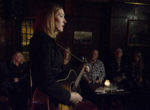 “Living on Lonely” – Hannah Aldridge – This song is from Hannah’s “Gold Rush” album, which was released this year. I’ve heard Hannah play the title song live over about eighteen months and I was convinced it would be my favourite song on the album (it’s a stunningly good song) but after hearing the album and hearing Hannah play the songs live this year, it’s “Living on Lonely” that has really made an impact. It’s a slow-paced piece dealing with the loneliness of life on the road and the inevitable temptations of that lifestyle. There’s some gorgeous low-register guitar running through the song and Hannah’s vocal is heart-rendingly melancholic. It’s just beautiful.
“Living on Lonely” – Hannah Aldridge – This song is from Hannah’s “Gold Rush” album, which was released this year. I’ve heard Hannah play the title song live over about eighteen months and I was convinced it would be my favourite song on the album (it’s a stunningly good song) but after hearing the album and hearing Hannah play the songs live this year, it’s “Living on Lonely” that has really made an impact. It’s a slow-paced piece dealing with the loneliness of life on the road and the inevitable temptations of that lifestyle. There’s some gorgeous low-register guitar running through the song and Hannah’s vocal is heart-rendingly melancholic. It’s just beautiful.
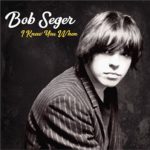 “I Knew You When” – Bob Seger – When he released “Ride Out” in 2014, it had the feel of a farewell to the music business and there were plenty of rumours that it was Bob Seger’s swansong, and maybe it was, at that time; it would have been a great album to bow out on. Everything changed on January 18, 2016 with the death of his good friend from Detroit, Glenn Frey. It’s taken a while to process, but he’s used the pain and love for his old friend to form the back bone of another great late career album. He’s always been a master of the mid-tempo rock song evoking late fifties early sixties smalltown America and “I Knew You When” is a perfect example of the style with the added poignancy of a personal connection.
“I Knew You When” – Bob Seger – When he released “Ride Out” in 2014, it had the feel of a farewell to the music business and there were plenty of rumours that it was Bob Seger’s swansong, and maybe it was, at that time; it would have been a great album to bow out on. Everything changed on January 18, 2016 with the death of his good friend from Detroit, Glenn Frey. It’s taken a while to process, but he’s used the pain and love for his old friend to form the back bone of another great late career album. He’s always been a master of the mid-tempo rock song evoking late fifties early sixties smalltown America and “I Knew You When” is a perfect example of the style with the added poignancy of a personal connection.
 “1954” – Hannah Rose Platt – This is one of those that grabbed me instantly: first play. I know it’s four years old, but 2017 was when I heard it first, so it’s going in. I love Hannah’s songs; she has a gift for melody and knows how to tell a story. This is based on a story told to her by a housemate about a care home patient who dressed up every evening to wait for a date that never arrived. Hannah relocated the story from Liverpool to America, added just enough detail to make it feel real and created a heart-breaking little masterpiece. I heard her play it live last weekend and it was just perfect. She has an album coming out in 2018 and I’m certain we’ll be reviewing it here.
“1954” – Hannah Rose Platt – This is one of those that grabbed me instantly: first play. I know it’s four years old, but 2017 was when I heard it first, so it’s going in. I love Hannah’s songs; she has a gift for melody and knows how to tell a story. This is based on a story told to her by a housemate about a care home patient who dressed up every evening to wait for a date that never arrived. Hannah relocated the story from Liverpool to America, added just enough detail to make it feel real and created a heart-breaking little masterpiece. I heard her play it live last weekend and it was just perfect. She has an album coming out in 2018 and I’m certain we’ll be reviewing it here.
 “Your Balloon is Rising” – Stone Foundation featuring Paul Weller – I have so much admiration for these guys. They’ve done it the hard way without any help (until this year) from the music establishment. They’ve written, recorded, gigged and written, recorded, gigged until they built up a substantial fanbase in the UK, Europe and Japan then suddenly Paul Weller was producing their latest album “Street Rituals” at Black Barn as well as co-writing and making guest appearances. Here’s one of those guest appearances on a beautiful soul ballad that’s absolutely timeless. Weller’s voice works with the song, but even without him it sounds just fine with a Neil Jones vocal.
“Your Balloon is Rising” – Stone Foundation featuring Paul Weller – I have so much admiration for these guys. They’ve done it the hard way without any help (until this year) from the music establishment. They’ve written, recorded, gigged and written, recorded, gigged until they built up a substantial fanbase in the UK, Europe and Japan then suddenly Paul Weller was producing their latest album “Street Rituals” at Black Barn as well as co-writing and making guest appearances. Here’s one of those guest appearances on a beautiful soul ballad that’s absolutely timeless. Weller’s voice works with the song, but even without him it sounds just fine with a Neil Jones vocal.
 “Tennessee Night” – Ed Dupas – I’m rapidly becoming a big fan of Ed Dupas as a songwriter and a singer. He has a passion for his craft and combines rock and country sounds in a way that reminds me a little of Bob Seger (coincidentally). “Tennessee Night” is the title song from his 2017 album and is a perfect little vignette that evokes “Texasville”, the sequel to “The Last Picture Show”, where the small-town girl returns from the big bad city and there might be a happy ending, or there might not. The answer’s left hanging in the Tennessee night. It’s a classic piece of songwriting from an artist with a true passion for his craft.
“Tennessee Night” – Ed Dupas – I’m rapidly becoming a big fan of Ed Dupas as a songwriter and a singer. He has a passion for his craft and combines rock and country sounds in a way that reminds me a little of Bob Seger (coincidentally). “Tennessee Night” is the title song from his 2017 album and is a perfect little vignette that evokes “Texasville”, the sequel to “The Last Picture Show”, where the small-town girl returns from the big bad city and there might be a happy ending, or there might not. The answer’s left hanging in the Tennessee night. It’s a classic piece of songwriting from an artist with a true passion for his craft.
If you use Spotify, give these songs a listen. They’re all worth it.
We love the way different artists interpret the High Fives brief. Yesterday we had post-gig diners, today we have something very different. Allan reviewed and loved the last two Ed Dupas albums, but even he was surprised by the effort Ed put into this piece. It’s an artist’s appreciation of artists and great piece of writing. This hasn’t been edited in any way, we only had to paste it in:
Ed Dupas: Top Five Conscious Musical Artists
Throughout my life, I have watched the value of the arts decline, whether in schools, synagogues, or in matters of social priority. In a world ever more driven by technological advancement and headless growth, strong, conscious artists are in dire need. The role of the artist is no triviality, despite modern devaluations. True artists live on the front lines of evolution, travelling beyond their comfort zones in hopes of gaining new perspectives which, once filtered through the lens of their unique consciousness, become gifts which they offer to society. These gifts give us hope, act as beacons, and help us make sense of our own lives in the face of turbulent times. In this way, true artists do not seek fame or fortune, they seek to make gifts of their lives, gifts of themselves. Here are five such artists that have been gifts to my life.
 Dar Williams
Dar Williams
“It’s funny how life at its best expands, explodes, and it overspills
But we try to fit it all in a grid, and we say it’s the strength of our will”
This legend of the folk genre has been a favorite of mine since the 90s, when an old college girlfriend dragged me out to one her shows. My defenses were up as I entered the venue, but Williams, standing alone on stage in her then trademark chocolate brown dress, dismantled them. She was poignant, thoughtful, talented, open, and honest. She was herself: at ease in her own skin, even when she wasn’t. Her openness and grace allowed her to make an authentic connection with the audience and, as the years have passed, I have found her music to be both a friend and an ally. For my own part, I have watched life’s circle fold in upon itself as only it can, eventually finding myself standing on stages and talking to crowds. As I do so, I remind myself of that Dar Williams show, and I do my best to give to people in the way I watched her do it so many years ago.
 Sturgill Simpson
Sturgill Simpson
“Woke up today and decided to kill my ego
It never done me no good no how”
In observing the rise of Sturgill Simpson, I’ve likened the Kentucky-born artist to a battering-ram: an irresistible force hurtling headlong into an immovable music industry. At the present moment, there is no musical story more compelling to me than Sturgill’s. Not because he writes great songs or sings well, although both are true. What intrigues me about Sturgill is the way he moves through the world, his dogged adherence to honesty and authenticity in an industry defined by plastic songs and copycat artists.
Contemporary music is largely defined by competition, yet, that is not the game Sturgill appears to be playing. In contrast to the industry at large, Simpson seems to view things through an altered lens, seeing himself as his greatest barrier to success, rather than other musicians. Approached this way, one’s artistic journey isn’t defined by besting the competition – but by competing to be one’s best self. For an artist, this takes the form of constant self-assessment and self-creation. One who understands the nature of art to be uniqueness, knows that true art has no natural competition. This being the case, I respect artists who aren’t concerned with trends or sounding relevant, but with being better versions of themselves — with digging a little deeper. In this way, they create trends. In this way, they are relevant. Sturgill is as good an example of this as any.
 Bruce Cockburn
Bruce Cockburn
“Nothing worth having comes without some kind of fight
Got to kick at the darkness ’til it bleeds daylight”
Bruce Cockburn sets an important example in the way he manages the weight of his artistry. In modernity, we place a great emphasis on physicality, to the extent that in some scientific circles, what cannot be measured is not be considered relevant. Artists do not have the luxury of such beliefs. Mystic tradition speaks of thought, word and deed, illustrating an oft overlooked mystery regarding the nature of matter, and underscoring the reality that every physical creation was once just a thought in someone’s mind. In other words, everything physical arrives at that state via non-physicality. Artists are those who inhabit in that gap, wrestling with feelings, shaping them into dreams, and leveraging those dreams towards creative action. Cockburn’s Stab At Matter takes a playfully arranged look at this process, suggesting not only its relevance, but its centrality to the human experience.
Artistic pursuits can be isolated and troubling, for the artist’s journey is by nature one of solitude. Cockburn, to his credit, has walked an authentic path while remaining largely transparent regarding the challenges of a life dedicated to creation and honest expression. His songs present as timeless, each one illustrating a particular aspect of human struggle in the modern age. A song such as If I Had A Rocket Launcher explores the limitations of a pacifist ethos in the face of oppression, while Pacing the Cage gives voice to the weightiness of existence itself. Bruce Cockburn stands his ground, tackling tough subjects, while holding firm to his place and openly owning his limitations. Artists such as Cockburn provide solid examples for the rest of us, viewing the world through unfiltered eyes, giving a voice to the voiceless, and painting pictures from a more enlightened perspective, one we may learn hold together someday.
 Leonard Cohen
Leonard Cohen
“Ring the bells that still can ring, forget your perfect offering
There is a crack in everything, that’s how the light gets in.”
Canadian singer-songwriter Leonard Cohen exemplified a spirit of curiosity, openness and honesty. His fourteenth and final album, You Want It Darker, was released just 19 days before his death in 2016. Cohen’s lyrics betray a mystic, wandering spirit, typical of artists. In his song, Suzanne, Cohen opines as to Jesus’ intentions, “and when he knew for certain only drowning men could see him, he said all men will be sailors then until the sea shall free them.” In a similar vein, Anthem states, “every heart to love will come, but like a refugee.” In broad, heartfelt themes, Cohen sings of bravery and solitude, requirements for any person seeking to possess an open-heart and a free mind. Cohen paints this journey as one each person must make alone: a passage into darkness that gives way to light in some circular, counter-intuitive fashion. This theme is reminiscent of Sting’s All This Time, “men go crazy in congregations, they only get better one by one.” Interesting that Cohen, with his final effort, left us with such a striking, parting message: You Want It Darker.
 Jackson Browne
Jackson Browne
“Just do the steps that you’ve been shown, by everyone you’ve ever known
Until the dance becomes your very own“
In the 1990’s (during my plaid-coat-wearing, barista days), I found that I wasn’t quite up for the intensity of the grunge scene, despite proudly wearing the uniform. While friends listened to Pearl Jam, The Smashing Pumpkins, and Nirvana, I lost myself in the singer-songwriters of the 70’s such as: James Taylor, John Denver, and Jackson Browne, to name a few. As the decades passed, I moved away from much of that music, even coming to embrace grunge, more or less. However, Jackson Browne has remained a fixture in my music collection.
Browne’s songs manage to be thoughtful and introspective while possessing an activist sensibility in keeping with his generation. In his song Looking East, Browne critiques his homeland as being a place “where the search for the truth is conducted with a wink and a nod, and where power and position are equated with the grace of God.” As is the way of the artist, Browne seeks to understand his place in the world more clearly through his songs, “I’d have to say that my favorite thing is writing a song that really says how I feel, what I believe – and it even explains the world to myself better than I knew it.” In living and creating this way, Browne not only helps and serves himself, but his fellow humans as well — myself included.
 After his outstanding debut “American Life” in 2015, this must be that difficult second album for Ed Dupas. However difficult its conception (and it sounds like there were a few painful moments), the end result is a fulfilling follow-up to his debut. It’s a progression of course; at times Ed puts his acoustic to one side to add a second over-driven electric to the guitar attack, creating a big widescreen sound that brings to mind early Bruce Hornsby and maybe even “Darkness”-era Springsteen.
After his outstanding debut “American Life” in 2015, this must be that difficult second album for Ed Dupas. However difficult its conception (and it sounds like there were a few painful moments), the end result is a fulfilling follow-up to his debut. It’s a progression of course; at times Ed puts his acoustic to one side to add a second over-driven electric to the guitar attack, creating a big widescreen sound that brings to mind early Bruce Hornsby and maybe even “Darkness”-era Springsteen.
And that’s the way the album opens; “Too Big to Fail” is a rocker packed with big, loud guitars delivering Ed’s perfectly crafted song. His lyrics are clever and subtle, combining the “too big to fail” business/sports franchise mantra with subtle allusions to the state of contemporary America; it doesn’t matter how bad things are, ‘love’s too big to fail’. I really hope so. The album’s second song, “Two Wrongs”, continues the two guitar attack with lyrics seamlessly interweaving the increasing isolation of rural America with a short-term, unwise, dalliance; real life might look simple on the surface, but it’s usually messy underneath.
The remainder of the album mixes country and rock stylings to great effect, combining the two perfectly in the title track, which takes up the themes of “The Wild Side of Life” and “Bright Lights, Big City” while giving the story a happy ending (well, maybe). The album’s closer “Hold Me Tight” has echoes of Bob Seger’s acoustic side (well, Ed is based in Ann Arbor) and neatly finishes the journey from the opening rockers to the closing mixture of regret and nostalgia.
I’m rapidly becoming a big fan of Ed Dupas; the delivery is impossible to fault and his songs are superbly crafted with the emphasis on subtle allusion rather than declamation. It’s difficult not to admire a songwriter that trusts his audience to think and interpret for itself and put in a little effort to appreciate the songs.
While I’ve got your attention, I’d just like to point you in the direction of a song from Ed’s 2015 debut album. “Flag” is a beautiful example of the songwriter’s craft and would move the hardest heart. Give it a listen and tell me I’m wrong. Now how about some UK appearances, Ed?
“Tennessee Night” is released in the UK on Friday July 28 on Road Trip Songs.
We reviewed the Ed Dupas album “A Good American Life” in August 2015 and Allan was extremely impressed, picking out “Flag” as one of his top five songs of the year. Our good friends at Gpromo asked Ed to contribute to the High Fives feature and he pulled out all the stops with this insight into his most listened-to albums. Many thanks to Ed for this great piece and a wonderful album.
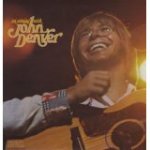 John Denver – “An Evening with John Denver” (Vinyl)
John Denver – “An Evening with John Denver” (Vinyl)
It was the mid-to-late seventies and we had a Curtis-Mathes television with a turntable and two speakers that flanked the screen on either side, all built into a (sort of) fancy wooden cabinet. It was a simpler time for me and, I suppose, pretty much everyone living back then. I’d slide the large wooden living room door closed whenever I had the chance and listen to records hour after hour. “An Evening with John Denver” was my first album of choice; my first favorite. It was the album I reached for again and again at the tender age of seven.
The album faced stiff competition as my parents had pretty good tastes in music. Don McLean’s “American Pie” and Simon and Garfunkel’s “Concert in Central Park” were just a couple of the others in our collection, and they exerted a strong gravitational pull. Although I loved those records, “An Evening with John Denver” captured my imagination in a different way. My favorite song was “The Eagle and the Hawk” and I would listen to it over and over again.
I still have the album on vinyl…man, John Denver was in his prime when the record was recorded. I’ve always considered this album to be the zenith of his career.
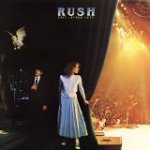 Rush – “Exit Stage Left” (Cassette Tape, Hi-Res Digital)
Rush – “Exit Stage Left” (Cassette Tape, Hi-Res Digital)
I bought this album on cassette as a teen, it was such a random purchase, so careless really. I couldn’t have known then–they had me before I even saw them coming–one minute I was a normal teen and the next I was a Rush fan. Alright, I suppose that’s not quite honest…normal teens don’t become Rush fans. Suffice to say, one minute I was something other than a normal teen and the next I was a Rush fan.
I’m not hyper-crazy or anything, sure I can probably recite most lyrics pre-1992 by heart, but I’ve only seen the band play live nine times, which in the Rush-world makes me a seasoned fan. Those Canadians, there’s gotta be something in the water, or maybe it’s something not in the water…?
“Exit Stage Left” was my first and has remained my favorite Rush record. My top track is “Red Barchetta”…but you gotta let it play through to the end of “YYZ”, that’s the trick.
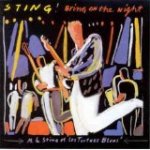 Sting – “Bring On the Night” (Cassette, Compact Disc)
Sting – “Bring On the Night” (Cassette, Compact Disc)
When I honestly consider the five records I’ve listened to over and over again–and still listen to—“Bring On the Night” has to be on the list. And why not? Branford Marsalis, Omar Hakim, and on and on, the band is grand down to the man (or woman). It was a double-cassette album, somewhat rare in that respect…and I wore those tapes out.
Bring On the Night” is a hypnotic collection of jams disguised as songs. When you listen closely to the record it’s almost as if the band is breathing, their energy ebbing and flowing. I remember one particularly tragic night in college when I was beyond sleep, I just lay awake all night with “Bring On the Night” record repeating. Thankfully I’d upgraded to CD format by then.
“I Burn for You” is my favorite song on the record, to me it’s a great example of what can happen when a group of individual musicians gel and temporarily evolve into one, albeit short-lived, entity.
 Peter Gabriel – “Passion” (Compact Disc)
Peter Gabriel – “Passion” (Compact Disc)
Originally recorded as the soundtrack for Martin Scorsese’s “The Last Temptation of Christ”, I’ve gotten more mileage out of “Passion” than any other album. In college it would play over and over again as I was writing papers or reading those God-awful tomes they call textbooks. Sometimes I would be lost in thought for hours with “Passion” dutifully playing in the background, never demanding too much attention, but when I’d stop to listen there was always something amazing to hear. I love that aspect of this record. I don’t, however, recommend it for sleeping.
I worked full-time at a cafe in college (a barista in the grunge era, no lie) and I’d let “Passion” play as the house music from time to time. It consistently got more interest than anything else. It’s a righteous record, a seeker’s record, and it’s my “going deep” album to this very day. It is my goto soundtrack when I want to power up the world-wide-web and crawl down some esoteric or scientific wormhole (and seriously…that does happen a great deal…if I wasn’t writing this right now that’s totally what I’d be doing). I set the album to repeat, press play, and let it flow together as an unbroken circle.
My favorite track is number 7, “A Different Drum”. A predictable choice, but unavoidable, really.
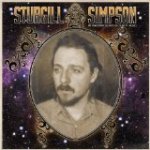 Sturgill Simpson – “Metamodern Sounds in Country Music” (Vinyl, Hi-Res Digital)
Sturgill Simpson – “Metamodern Sounds in Country Music” (Vinyl, Hi-Res Digital)
Alright, so this is a new record and, admittedly, it’s not one I’ve listened to for decades, but it’s a classic record; it was the day it was made, the world just didn’t know it yet. It’s a record that I will listen to for decades to come, so it rounds out the top 5 nicely.
Something tells me this record was a hard-fought accomplishment for Sturgill. It’s a striking concept album (with love being the concept). “Metamodern…” is a work of shared introspection in which an honest guy–a self-described ‘van driver who plays music’–gets into some seriously weighty areas of science, evolution and mysticism. With references to Stephen Hawking’s “A Brief History of Time”, Pierre Teilhard de Chardin’s “The Phenomenon of Man”, and numerous esoteric traditions, Sturgill shows himself to be an interestingly learned man (and it’s not the kind of stuff they teach in school). You can’t just write an album like “Metamodern…”, you have to live it, become it. As the record states, ‘you have to let go so the soul may fall’.
“Metamodern…” is a masterpiece recorded on a $4000 working budget. In the music industry that’s not a shoestring budget, that’s a fraction of a shoestring budget. There are some of us out here that need to believe that kind of thing is possible…that a true artist, motivated by inspiration and his or her desire to share their unique gifts with the world can find a way to do that, despite all the obstacles. If this sort of thing appeals to you like it does me I highly recommend “Metamodern Sounds in Country Music”. Nashville has consistently ignored Sturgill, but the people love him. I’m OK with that, and I’d guess that Sturgill is too. I don’t think he had Nashville in mind when he made this record.
I highly recommend track 8, “Just Let Go”. ‘Woke up today and decided to kill my ego…’
And the people love it…it’s an interesting time to be alive.
It’s not so long since this feature would have been ‘Top Five Singles’, but the concept of a single seems almost irrelevant outside the Radio 1 bubble and my friends in real radio call them ‘lead tracks’ now, so I’m picking my own lead tracks from some of the albums I’ve reviewed this year. These are five songs that grabbed me at the first listen and left me either elated or emotionally drained. If you don’t listen to anything else I’ve recommended, give these a spin; they all come from good or great albums, but they’re standout examples of superb songwriting, performance and production. They aren’t in any particular order, so where do we start?
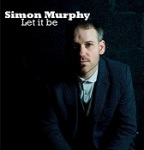 “Not in My Name” – Simon Murphy
“Not in My Name” – Simon Murphy
Simon Murphy’s debut album, “Let it Be”, was released in September of this year and it’s packed with songs that are well-crafted musically and lyrically. “Not in My Name” stands out as one of the simpler songs on the album, but it packs an emotional punch made even more potent by the events of the last few weeks. It could easily be a very angry song, but Simon’s delivery has a much more world-weary feel, hinting at fatigue rather than anger. This is a song that could easily be an anthem but works so well because it doesn’t go down that route.
This is another song from a debut album. Hannah is from Muscle Shoals, Alabama and her stunning debut album, “Razor Wire” is packed with autobiographical, emotive and often harrowing songs; “Parchman” is an exception. It was inspired by a TV documentary about a woman on death row in Mississippi State Penitentiary (or Parchman Farm) awaiting execution for the murder of her abusive husband. For the first time, her life has a structure and she knows how it will end. I won’t pretend it’s an easy listen, but it’s a superb song. When Hannah played it live at Green Note in July, she told the audience the back story and went on to say that she would probably have taken the same way out of the situation; how many of us would say exactly the same?
Pete’s much-anticipated masterpiece “Heart of Gotham” was released this year; the album took about ten years to make as Pete worked on it between various other projects, including albums by The Kennedys, his own guitar album “Tone, Twang and Taste” and work with Nanci Griffith’s Blue Moon Orchestra. The entire album is a fabulous piece of work, and “Union Square”, as the opening song, is a perfect example of Pete’s work. If you can imagine The Byrds fronted by Springsteen, then you probably have a good idea how this sounds. Pete’s crystal-clean guitars contrast beautifully with his rasping vocal delivery as he sings a song packed with literary and historical references to his favourite city. Although the song has an immediate musical impact, each subsequent listen will reveal a lyric that passed you by originally; I can listen to this again and again.
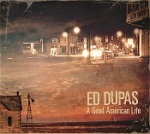 “Flag” – Ed Dupas
“Flag” – Ed Dupas
From the album “A Good American Life”, this is a classic example of a turnaround song (I’m going to admit here that the final two songs will both pull on your heartstrings if you have a heart). Musically, “Flag” is pretty straightforward and the lyrics appear to tell the story of an idyllic American town overlooked by the flag and a hint of patriotism with the refrain ‘red, white and blue till their dying day’. The sting is in the final verse; as soon as Ed sings about the flag being folded, the tone changes and you know that it’s about a dead serviceman and a bereaved family. It still brings a tear to my eye every time I hear it.
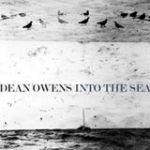 “Sally’s Song (I Dreamed of Michael Marra) – Dean Owens
“Sally’s Song (I Dreamed of Michael Marra) – Dean Owens
Dean’s latest album, “Into the Sea”, is an intensely personal and nostalgic piece of work, looking back to more innocent times and plotting the erratic courses (sometimes happy, sometimes tragic) of old school friends. “Sally’s Song”, over a Pachelbel’s Canon-style backing, uses the demolition of an old housing scheme as a trigger for memories of old friends doing well and badly. It’s a particularly Scottish song, making references to Billy Mackenzie and Michael Marra and it pushes all of my buttons, every time.
I’ve picked out individual tracks from five albums, but, honestly, you should have a listen to all five albums as well.
 Now, here’s an interesting debut. Born in Texas, brought up in Winnipeg and now based in Ann Arbor, Michigan, Ed Dupas has definitely paid his dues, as we oldies say, and he’s released a cracking album. He’s spent years playing acoustic covers in bars around Detroit while writing his own material and the efforts he’s made in writing and performance are evident in the quality of “A Good American Life”. This is an album that doesn’t need any production gimmicks to get its message over; the songs are strong and the simple arrangements and understated vocals are much more effective than any amount of studio tricks.
Now, here’s an interesting debut. Born in Texas, brought up in Winnipeg and now based in Ann Arbor, Michigan, Ed Dupas has definitely paid his dues, as we oldies say, and he’s released a cracking album. He’s spent years playing acoustic covers in bars around Detroit while writing his own material and the efforts he’s made in writing and performance are evident in the quality of “A Good American Life”. This is an album that doesn’t need any production gimmicks to get its message over; the songs are strong and the simple arrangements and understated vocals are much more effective than any amount of studio tricks.
Two-thirds of the songs on “A Good American Life” have the personal themes that you might expect from an Americana singer-songwriter; “Remember My Love” and “Too Late Now” are about the singer’s perspective on broken relationships, while “With Love You Never Know” (a duet with Tara Cleveland) looks at a breakup from a female point of view and “You Don’t Get to Explain” talks about the kind of betrayal so complete that it leads to total ostracism. Ed skirts around the nature of the betrayal in an oblique style that is used in several songs on the album; it’s a particularly effective device because it reflects the way we tell our stories and it gives the songs a very human touch.
“Without You” and “Whiskey Bones” are love songs, powerfully and beautifully underplayed, while “Home in Time” is the story of someone who has escaped being dragged back home by a major event. Again, it’s an oblique reference, but the song isn’t any weaker because the event is unspecified; and it’s a very powerful story. “Until Blue Comes ‘Round” is a look at the cycles of life using a colour metaphor, which is, again, highly effective.
As good as those songs are, and they’re very, very good, it’s the remaining third, including the title track, that really do it for me. It’s acceptable to be a political singer-songwriter these days: Jackson Browne’s been doing it for years, the Boss’s “Wrecking Ball” ripped in to the bankers and Shakey now has the world record for mentions of Monsanto and Starbucks on one album (and a great album, at that) but Ed’s a bit more subtle than that. “A Good American Life” (with a sneaky piano fill reference to the Bangles’ “Manic Monday”) opens the album with a look at the way we come to accept the treadmill of everyday life while “This Old Town” and “Train” explore the themes that Springsteen used on “Wrecking Ball”, the death of towns when industry vanishes and the ubiquity of bankers in modern society.
“Flag” is an absolute gem of a song. Ed uses a bit of lyrical sleight of hand with a refrain of ‘red, white and blue till the day I die’ to suggest a gentle song about American patriotism then delivers the knockout punch as the flag’s folded and handed to someone’s widow. It’s a song that’s beautifully put together and incredibly moving; easy to listen to, hard to forget. All of the songs are all perfectly crafted little stories that don’t need any frills, just a gentle delivery and a willing audience. You should join that audience.
Released in the UK August 28 2015 on Mackinaw Harvest Records.



